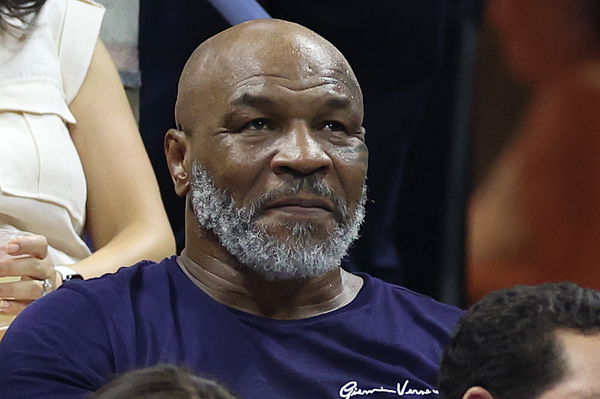
via Getty
NEW YORK, NEW YORK – AUGUST 29: Mike Tyson looks on during the Women’s Singles First Round match between Serena Williams of the United States and Danka Kovinic of Montenegro on Day One of the 2022 US Open at USTA Billie Jean King National Tennis Center on August 29, 2022 in the Flushing neighborhood of the Queens borough of New York City. (Photo by Al Bello/Getty Images)

via Getty
NEW YORK, NEW YORK – AUGUST 29: Mike Tyson looks on during the Women’s Singles First Round match between Serena Williams of the United States and Danka Kovinic of Montenegro on Day One of the 2022 US Open at USTA Billie Jean King National Tennis Center on August 29, 2022 in the Flushing neighborhood of the Queens borough of New York City. (Photo by Al Bello/Getty Images)
In the swirling vortex where fame, power, and morality meet, the specter of Pablo Escobar hovers ominously. This tantalizing intersection forms the backdrop for an unlikely dialogue between Mike Tyson, a boxing legend infamous for his raw power and tumultuous personal life, and J Balvin, a global reggaeton superstar hailing from Escobar’s homeland, Colombia. In a recent episode of the ‘Hotboxin’ with Mike Tyson’ podcast, their discussion takes an unexpected detour into the realm of narco-culture and Escobar’s influence.
Balvin throws a curious curveball, comparing Tyson’s lifestyle to that of the feared drug lords. But why? And what does Tyson have to say about it? Uncover the unexpected truths and startling revelations as these two prominent figures dissect the influence of the notorious on the lifestyles of the celebrated.
Unmasking Escobar’s influence: A deep dive into the Mike Tyson-Balvin conversation
ADVERTISEMENT
Article continues below this ad
As they delved into the podcast, the conversation took an intriguing twist towards the influence of infamous drug lord, Pablo Escobar. Tyson began, reflecting on the perception of Escobar in America. He remarked, “People here in the city think he’s the f***in God.” Initially misunderstanding, Balvin queried, “In Colombia?” to which Tyson clarified, “No I’m talking about here(USA).”
Balvin expressed his understanding, stating, “Oh here? Ofcourse around the world, people think he was a god.” Tyson further expounded on this, saying that in America, Escobar was “the man for people that never had nothing in their lives,” embodying a symbol of escape from hardship.
Their conversation then began to highlight the parallels between Mike’s lifestyle and that of Pablo Escobar. Balvin shared a fascinating observation, “Yeah but if you check the way he was living it’s actually the way you live you know, like you, you get so much you know Fame and power that you can live actually the same way as the narcos do.”
Tyson agreed, saying, “I do I do,” and even went on to describe himself as a gangster, acknowledging that these figures had influenced his lifestyle. He added, “100%, they taught me how to live.”
Balvin then added a crucial qualifier to this acknowledgment, “Okay they told you how to live but not selling drugs.” Tyson assented, clarifying, “No I’m not, first I’m talking about the lifestyle.”
ADVERTISEMENT
Article continues below this ad
As the discussion progressed, they touched upon the essence of their lifestyles and the perceived extravagance associated with them. Balvin continued, “The lifestyle I’m saying, we live like gangsters of course. You know, guys are gonna, they have cars and women’s and that you can have that you know, but doing the right thing. Yeah the lifestyle might come from these guys but it doesn’t mean you know you have to be a-“
Read More: Watch: J Balvin Makes Fun of ‘Iron’ Mike Tyson to His Face for Humming His Hit Song
Tyson concluded this thought, saying, “You don’t have to be a guy that won all the women and girls, but just the style and lifestyle to be able to know I’m secured for life until I die.”
ADVERTISEMENT
Article continues below this ad
Thus, through their candid conversation, both Tyson and Balvin began to unravel the complexities of fame and the impact of figures like Escobar on modern-day lifestyles.
Watch this story: Mike Tyson feared he had killed a gang leader in a street fight
As they navigated the lure of the ‘gangster’ lifestyle and the importance of making ethical choices, they provided a timely reminder that fame and power should be pursued responsibly. In a world where the notorious is often glorified, it’s crucial to critically evaluate their impact and legacy. What do you think about this dynamic of influence and the responsibility it brings? How do you perceive the impact of notorious figures on contemporary lifestyles and choices? Share your thoughts and join the conversation.

